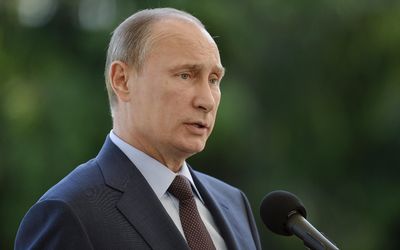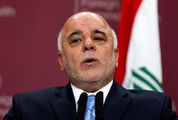Putin parade set to rock the leaky boat of unity in Europe
by Pooma Kimis,
2014-03-12 05:49:19.0
A CURIOUS and destructive European symmetry appears to be at work. The tussle over Ukraine, and the smaller, interrelated but potentially no less violent tug-of-war over multiethnic, multilingual Crimea, have sparked off destabilising ructions in an entity supposedly reflecting the continent’s centuries-old craving for unity: the European Union.
Russian President Vladimir Putin has drawn up his parade of political and military power in front of a Europe that appears pitifully weak and divided. European leaders have been exposed not as a collective united for action, but as heads of an assortment of sovereign states nervously protecting their own interests.
Domestic political constraints undoubtedly play a role. Arguing in favour of maintaining French warship supply contracts for Russia, French President François Hollande has wielded the defence of respecting contractual law and upholding France’s business reputation. In view of his poor political standing and worries over job losses in key industries, a more relevant consideration may be his fears that scuppered arms deals would further lower his poll ratings. The spectre of unemployment, not the spectacle of Russia holding Ukraine to ransom, may be what worries the French public.
The Germans, too, are reluctant to take a stand. Post-Cold War Germany no longer confronts the Soviet empire across its eastern border, but Chancellor Angela Merkel is weighed down still by the legacy of German atrocities in the East during the Second World War. She prefers to focus on internal economic and social problems, rather than putting Germany out on a limb by, for example, backing away from oil and gas supply contracts vital for supporting an economy already vulnerable to higher energy prices.
William Hague, Britain’s foreign secretary, has huffed and puffed about turning off the Russian gas tap and doing what the British always do in a crisis: turn to the US, in this case to secure shale gas supplies. But Europe’s dependence on Russian natural gas and good pipeline links weaken Europeans’ ability to take a strong stand. As ever, the European political stakes are streaked with grey.
The financial markets have shrugged off the dangers for now, but this could be premature. Some banks in Ukraine could go under, with a material effect on European banks with Ukrainian exposure. The hryvnia’s decline and the deteriorating macroeconomic environment east of the EU could send disruptive ripples across Europe’s heartlands. Some investors have swung back into Russian equities on the grounds that they are cheap after last month’s sell-off. But if the standoff turns into conflict, Russian bears will be back.
Mr Putin faces potentially grave consequences, both for his own reputation and for Russia’s future as a substantial power. Mr Putin wishes to emerge from a period of Russian passivity in the wake of what he sees as the catastrophe of the Soviet Union’s dissolution. For Russia’s tortured soul, he offers not revolution but resurrection. It is a high-risk route that could bring Europe to the brink. Whatever happens, the Russian president has embarked on a journey that can hardly be expected to end in glory.
• Kimis is head of business at the Official Monetary and Financial Instutions Forum, a UK thinktank.

Russian President Vladimir Putin speaks at a news conference at the presidential summer residence Kultaranta in Naantali in June last year. Picture: REUTERS
A CURIOUS and destructive European symmetry appears to be at work. The tussle over Ukraine, and the smaller, interrelated but potentially no less violent tug-of-war over multiethnic, multilingual Crimea, have sparked off destabilising ructions in an entity supposedly reflecting the continent’s centuries-old craving for unity: the European Union.
Russian President Vladimir Putin has drawn up his parade of political and military power in front of a Europe that appears pitifully weak and divided. European leaders have been exposed not as a collective united for action, but as heads of an assortment of sovereign states nervously protecting their own interests.
Domestic political constraints undoubtedly play a role. Arguing in favour of maintaining French warship supply contracts for Russia, French President François Hollande has wielded the defence of respecting contractual law and upholding France’s business reputation. In view of his poor political standing and worries over job losses in key industries, a more relevant consideration may be his fears that scuppered arms deals would further lower his poll ratings. The spectre of unemployment, not the spectacle of Russia holding Ukraine to ransom, may be what worries the French public.
The Germans, too, are reluctant to take a stand. Post-Cold War Germany no longer confronts the Soviet empire across its eastern border, but Chancellor Angela Merkel is weighed down still by the legacy of German atrocities in the East during the Second World War. She prefers to focus on internal economic and social problems, rather than putting Germany out on a limb by, for example, backing away from oil and gas supply contracts vital for supporting an economy already vulnerable to higher energy prices.
William Hague, Britain’s foreign secretary, has huffed and puffed about turning off the Russian gas tap and doing what the British always do in a crisis: turn to the US, in this case to secure shale gas supplies. But Europe’s dependence on Russian natural gas and good pipeline links weaken Europeans’ ability to take a strong stand. As ever, the European political stakes are streaked with grey.
The financial markets have shrugged off the dangers for now, but this could be premature. Some banks in Ukraine could go under, with a material effect on European banks with Ukrainian exposure. The hryvnia’s decline and the deteriorating macroeconomic environment east of the EU could send disruptive ripples across Europe’s heartlands. Some investors have swung back into Russian equities on the grounds that they are cheap after last month’s sell-off. But if the standoff turns into conflict, Russian bears will be back.
Mr Putin faces potentially grave consequences, both for his own reputation and for Russia’s future as a substantial power. Mr Putin wishes to emerge from a period of Russian passivity in the wake of what he sees as the catastrophe of the Soviet Union’s dissolution. For Russia’s tortured soul, he offers not revolution but resurrection. It is a high-risk route that could bring Europe to the brink. Whatever happens, the Russian president has embarked on a journey that can hardly be expected to end in glory.
• Kimis is head of business at the Official Monetary and Financial Instutions Forum, a UK thinktank.






















Change: -0.47%
Change: -0.57%
Change: -1.76%
Change: -0.34%
Change: 0.02%
Data supplied by Profile Data
Change: -1.49%
Change: 0.09%
Change: -0.47%
Change: 0.00%
Change: -0.02%
Data supplied by Profile Data
Change: 0.48%
Change: 0.91%
Change: 0.38%
Change: -0.15%
Change: 0.93%
Data supplied by Profile Data
Change: 0.25%
Change: -0.32%
Change: 0.33%
Change: -1.22%
Change: -1.41%
Data supplied by Profile Data